Hi, it’s me, the millionth media critic to explain to you that HBO’s Westworld is a metaphor for a video game. But, it is. The problem is that Westworld is a really crappy video game.
Have you ever talked to someone who doesn’t play video games about what they think of games as a medium, and what they think about the people who play them? After having written about video games professionally for the past nine years of my life, this has become one of my favorite pastimes. Even if this hypothetical person plays games, they’ll often assure me they don’t really play games, because they assume I’m going to judge them for not knowing enough (I never do, of course). Eventually they’ll give me an overview of what they think most video games are like, and their description will end up sounding a lot like–funnily enough–Westworld.
Games are male power fantasies, right? That’s what my non-gamer friends tell me. They’ll often be familiar with the big-name open world games, like Grand Theft Auto (which is one of the games that inspired Westworld). They might remember seeing an advertisement for a game like Bayonetta or Tomb Raider, but they’re often unaware of the feminist reclamations of those characters or those games. Perhaps they’ve heard of Bioshock, the game that’s gotten a mainstream reputation as “the smart one”–a game that actually tried to be political, unlike all those other totally not-political games where you just wander around, shoot people, and hook up with ladies of the evening. Nothing political about that. (Kidding.)
Even Bioshock requires you to understand those classic gaming conventions before you grasp what it intended to subvert: the idea that a player should question the choices laid out for them. That was all revolutionary at the time it came out back in 2007, when I first started writing about games. It’s also when every games critic had a link to Clint Hocking’s “Ludonarrative Dissonance in Bioshock” in their blog sidebar.
Not that there’s anything wrong with that; all of that stuff is part of what the conversation around games has been for the past decade. But that’s why watching Westworld has felt like such a weird time-travel trip for me. Not a trip to the future, mind you, in spite of the fact that this TV show claims to tell a story of a far-off sci-fi dystopia in which all diseases have been cured and humanoid robots are yours for the romancing and/or raping. For me, Westworld feels like a time capsule to the place where video games were ten years ago, back when I was first starting out in the games criticism sphere.
I found it to be a bit of a relief when I learned the similarity was intentional. Co-creators (and married couple) Jonathan Nolan and Lisa Joy played many of the games from that time period as their research for this show; they both played Grand Theft Auto and Red Dead Redemption, for starters. Jonathan Nolan cited the Bioshock franchise as a personal favorite of his: “I was a big fan of the BioShock video games, which I thought were amongst the most literate and thoughtful pieces of entertainment that I’ve seen in the last ten years. Just brilliant.”
Nolan is the gaming fan of the pair; Lisa Joy hadn’t played these games before working on this show, but she dove into Red Dead and GTA in the name of research for Westworld. Nolan mocked her for not playing the game “correctly” (she sounds a bit like William on Westworld, if anything): “I have to report that my wife is the world’s most boring Grand Theft Auto player. I’ve never seen anyone who will actually obey the traffic signals.” To which Lisa Joy retorted: “The city looks beautiful if you just slow down and take the time. There was a lot of work that went into it! It’s gorgeous.”
I guess all those fights we’ve seen unfold between Logan and William on Westworld could be reflective of the real disagreements between Nolan and Joy regarding the “right” way to play a game. As the longtime gamer of the pair, Nolan (and Logan, on the show) seems to have some very entrenched ideas about what players “should” do, since he apparently has “never seen anyone” who doesn’t break all the rules in GTA. Meanwhile, Lisa Joy comes at this from the outsider perspective that I always find refreshing. She takes the time to enjoy the scenery. She notices the aspects of the game that, after years of playing games, Nolan has become unable to see.
Yet both of them seem unable to see the biases of the games they’ve chosen. I can hardly blame Lisa Joy for this, since it seems like Jonathan Nolan is the one who picked out the games that would influence Westworld, and indeed, that influence is deeply felt at every turn. And that’s not a good thing, in my view.
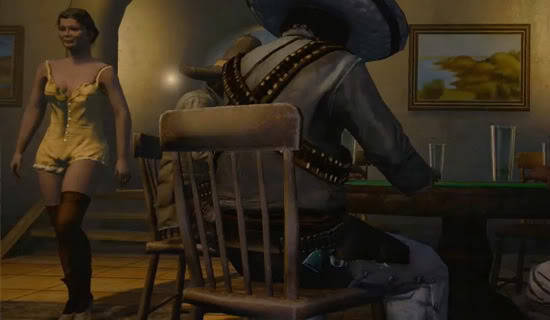 (image via Red Dead Redemption Wikia)
(image via Red Dead Redemption Wikia)
One of the biggest complaints that I have about games like Red Dead Redemption (which is shared by some of my colleagues here at The Mary Sue) is that absolutely nothing has changed in those games for years. The first Red Dead game, Red Dead Revolver, came out back in 2004. The next one has just been announced, and if the early promotional materials are any indication, the main thing that has changed in the game are the technical aspects—not, say, the protagonist or the framing of the story. The game looks beautiful, better than it ever did before. And it’s still about a grizzled dude gunslinger, because… why wouldn’t it be?
The complaints lobbied at previous Red Dead games, and at the upcoming Red Dead game, could just as easily be lobbied at Westworld. Women are cast as either damsels in distress or sex workers. Sometimes, there’s the occasional lady gunslinger, too–so what about them? In Westworld, we have the Snake Lady: a shotgun-toting bad-ass. Westworld makes sure we get at least one scene of her bathing naked in a river, as the villain of the show looks on approvingly at the snake tattoo that coils around her bare breasts, torso, and up her neck. Sure, that guy who’s spying on her boobs is a “bad guy,” but the camera (and the TV show viewer) is invited to check her out, too.
This is a total video game role for a woman. We’ve got the Virgin/Whore dichotomy with Dolores and Maeve, as stated. But by introducing the Snake-Lady gunslinger—and, later on, by allowing Dolores to “change” her role by putting her in men’s clothes and giving her a gun—we get to see the Strong Female Character archetype that’s classic to video games. This trope is a little harder to push back against, since of course, we whiny feminists are supposed to be satisfied that at least a female character gets to carry a gun, and shouldn’t that be enough for us? But I’m not sure the beautiful gunslinger archetype is any more empowering than these other two archetypes, particularly since they’re still always conventionally attractive, young, and – on Westworld, at least – presented as an object for men to ogle.
But that’s accurate to video games, right? Sure, it’s accurate to some video games. If you play Grand Theft Auto and Red Dead Redemption, and you draw conclusions about video games, this is what you’ll find. And even if you throw Tomb Raider in there, the best takeaway you’ll have is a character like the Snake-Lady. Not that I don’t enjoy the Tomb Raider and Bayonetta genre; I’ll take what I can get when it comes to playable women characters in high-budget action games. But the idea of the Snake Lady being “empowering”… let’s just say it’s a trope that could use some work.
I get that Westworld intends to lampoon these tropes, at least on some level. That’s probably why my favorite love-to-hate-him character on the show is Lee Sizemore, the jerk narrative designer behind the Westworld theme park, whose ideas about good storylines are cliché at best and bigoted at worst. Watching Dr. Ford shoot down Lee Sizemore’s storyline involving a rampage of “savages” attacking the town and stealing away “damsels” felt like a huge relief to me, because at least that meant we wouldn’t have to see something that reductive get played out on screen. Surely I could take this plot point as a sign that Westworld hoped to represent a more complex future for game narratives, be they live-action games (as the theme park is) or digital games or what have you. But is Dr. Ford’s vision for theme park storylines any better than anything Lee Sizemore’s done? His latest storyline idea revolves around casting himself as a literal god. Talk about a male power fantasy!
Whenever I remember that Westworld is supposed to be set in the future, I just feel sad. What a depressing future this would be–and how far it seems from our own! Games, and the discussions around them, have already changed so much since Bioshock came out. Heck, games discussions have already changed a lot since Bioshock: Infinite came out to mixed reception, and that was only in 2013, back when Westworld was still in development. I’m sure that Jonathan Nolan, a big fan of the Bioshock franchise, must have played Infinite as well. The game’s influence is felt strongly here, and again, I do wish Nolan had chosen a different influence than that game, because… yikes.
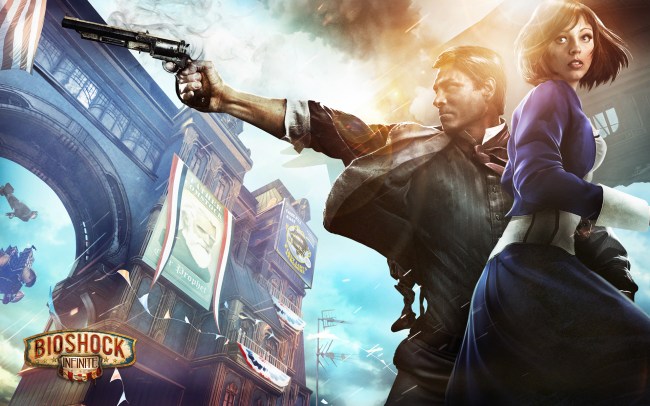 (image via BioshockInfinite.com)
(image via BioshockInfinite.com)
Back when Bioshock: Infinite came out, I wrote at length about the “daddification of games” – I took the paternalism of that game to task, as well as the same themes that I saw in another game that came out around that same time called The Last of Us. Both games told a story of a father figure navigating his relationship with his young-adult daughter. This is a similar story to one that we saw unfold in the pilot of Westworld, and daddy issues have continued to be a theme for Westworld‘s male characters since then. In Bioshock: Infinite, the put-upon daughter even wears a blue dress and eventually, learns how to kill so as to save both herself and the reluctant beard-scrabbled hero of the game. In watching Dolores’ story play out over the first four episodes of Westworld, I began to realize why I felt such an unnerving, familiar feeling of dread: this all felt like Bioshock: Infinite to me.
Oh, sure, there’s some Grand Theft Auto in there too. But that familiar lens of Bioshock‘s political issues has definitely shown up in Westworld, and I saw its influence before I even found the interview in which Jonathan Nolan admitted he’s a big fan. I’ll try not to spoil any of the major twists of the Bioshock games, but I will say that “both sides are equally bad” tends to be a common political theme in those games, so… get ready for Westworld to do that, I guess. The other themes that concern me are how marginalized people get portrayed in those games, and how rarely these games allow the player to sympathize with anyone other than a grizzled, bearded, dudely anti-hero who has daddy issues and moral dilemmas. It’s a story that video games have been telling for ages already, so I guess that’s why I’m just not that excited to see it get told again, in various forms, on Westworld.
I get that Westworld hopes to criticize the idea of male power fantasies, but it does so by telling a story about men and about masculinity, just as Bioshock: Infinite and even Grand Theft Auto do. The narrative conventions of video games provide the safe, in-story justification for why every female character is young and conventionally attractive. That’s also, I assume, why almost all of these women are positioned as love interests, or as victims, or pawns in a man’s scheme, or all of the above. It’s a commentary on video games. Sure. But it’s not a particularly new or prescient commentary, and it’s hardly a subversive one. It also doesn’t actually solve the problem that it’s supposedly commenting upon.
I’m not sure that Westworld is effective as a commentary on games as a result of that, since the show shies away from making the arguments that need to be made about these oppressive structures. Dolores picking up a gun and deciding to save herself—that’s, like, 2007-era games criticism. “What if Princess Peach saved herself” is a question that games critics are still asking, but… seriously, it’s been going on for decades. Maybe I’m just not being patient enough, but I don’t just want Dolores to put on a pair of pants and pick up a gun. I want her to have real narrative choices that don’t just revolve around the men in her vicinity. Even her methods for “escaping” Westworld revolve entirely around men, at least for the moment.
What’s more, I want to see what happens when people who don’t fit into the “male power fantasy” mold try to attend the Westworld theme park. I want to see people breaking the game and ruining the narrative in ways beyond just shooting a robot before a monologue is over. I want to see how marginalized people deal with the fact that this theme park is, literally, a romanticized and intentionally inaccurate version of the Old West that puts rose-colored glasses over sexism and racism.
That’s a story that’s happening in real life already: marginalized people play games that aren’t for them, so they change them, or they make their own. But instead of allowing for that reality, Westworld has created a society that is even more regressive than our own: a society where people who attend this park have, seemingly, no interest in anything other than rape, murder, and torture. You’d think gamers would be offended by the implication! You’d think men, in particular, would hate how this show characterizes them and their supposed power fantasies.
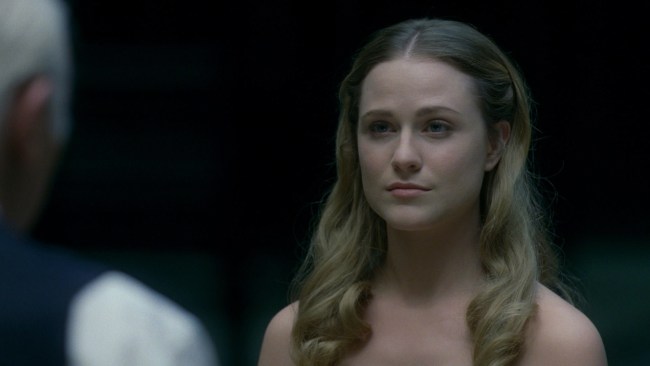
It’s not that I think Jonathan Nolan and Lisa Joy don’t “get” games. I just think that it’s too bad that the games they’ve chosen as their influences have what I consider to be reductive messages and themes–themes that some games have pushed back against, in the past decade. By choosing games like Bioshock and GTA, the writers of Westworld have indicated which types of storylines they think matter for their show, and which aspects of video game canon they want to bring to the forefront for new audiences.
It’s not necessarily their fault; the games they’ve used as influences are certainly popular, and those games have had a huge influence on many other games and on the criticism surrounding games in the time. But it’s a shame, I think, that neither of them seems to have gone any deeper than that in their own research, because I don’t see these games as the greatest possible example of what games can do or what they can be. They’re a starting point, but not the be-all-end-all. They’re very mainstream, big-budget games with reductive, simplistic stories that could take more risks, but don’t. One might, worryingly, say the same of Westworld, which–like a video game–has a huge budget and has taken years of development to come to fruition.
Like Black Mirror, I believe we’re supposed to think that Westworld is a prescient and haunting commentary about the dangers of technology, and specifically the idea of power fantasies and video games and virtual worlds and the idea of pretend violence… and whether that pretend violence says anything about us. “Are video games bad, actually?” This is the supposedly deep question that Westworld asks us. “What if gamers, but too much?”
I can tell I’m supposed to be disturbed. Instead, I’m just tired. I remember how long the conversations about Bioshock and Hotline Miami and Spec Ops: The Line went on. I was there for all of that, reading along, and responding with my own thousand-word think-pieces about the nature of violence in games and what the games we play say about us. So perhaps I’ve played too many video games, or read too much about video games, or thought too hard about them, to enjoy Westworld. Perhaps Westworld is designed to bring these arguments to the non-gaming audience, the viewers who didn’t read every blog post on Bioshock at the time. But even if that’s the case, so far, I’m not impressed by the arguments being made. Clint Hocking’s now-infamous blog post about Bioshock has more to say than Westworld, at least so far.
I’m not even sure I could adequately spell out for you what Westworld is trying to say, other than, “isn’t this all so fucked up?” Let’s just assume I already know that videogames from the 2000s are pretty fucked up, actually. I mean, I’ve played them. I know.
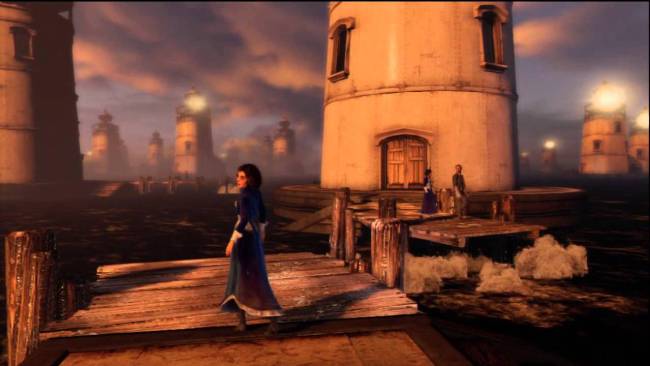 (image via YouTube)
(image via YouTube)
I try not to end on a dismal note when I’m criticizing anything this extensively, so instead, I’ll leave this piece off with a suggestion. I think it might be too late for Lisa Joy and Jonathan Nolan to play some new video games, because I know they’ve already planned out all the seasons of their show in advance. But I don’t know that I think Westworld should be relying so heavily on video game tropes at all. Not only is it played out (heh), it also doesn’t really make sense for the setting, since the closest allegory for the Westworld theme park shouldn’t really be video games, but rather Renaissance faires.
The first time I went to a Renaissance faire as a young child, it poured rain all day long. In spite of this, the actors at the park didn’t get to wear raincoats; the attendees did, standing out in comparison to the actors by wearing brightly-colored anachronistic symbols of their modern status. The park itself felt like a transformative experience for me; I already loved acting and theatre and “playing pretend” as a child, but never before had I seen a theatrical experience that relied so heavily on actors remaining in-character and improvising for so long, in every minute of their workday.
My favorite moment of the day unfolded just before my parents made me go home. I watched two of the actors get into a completely in-character duel, each vying for the affections of a lady who stood by watching. The lady who stood by was not a professional actor. She was not conventionally attractive. She was an older woman in an ugly raincoat with a hood that covered almost her entire forehead and eyes. She had her hands buried deep in the raincoat sleeves to keep them out of the rain; the most anyone could see of her face was a giggling grin.
She didn’t initiate the scene; it unfolded as she passed by, and she chose to stop and play along. One of the male actors had begged her for a handkerchief, and soon, another actor showed up and began improvising with him, both vying for the lady’s affections and telling joke after joke. Soon, a circle began to form to watch these two men improvising; the men drew their swords and pretended to fight, or at least, pretended they were going to fight. Every time the duel was about to begin, the first man would find some excuse not to start right away: “I just need to adjust my hat,” he would say. “Oh, I just need my lady to kiss my gloves.” The raincoat-clad woman, laughing all the while, would agree to kiss his gloves – his hat – and on and on.
The passers-by laughed and cheered, entranced by the scene. Even as a child, I was completely blown away by the fact that the actors were pretending as though this raincoat-wearing woman was a fine lady. “She’s just wearing a raincoat,” I thought, baffled. But of course, this was all part of the fantasy.
This isn’t even an interesting or new fantasy. Two guys fighting over you? It’s textbook! It’s bland! It’s cliché! And yet have we ever seen Westworld’s theme park even attempt something this straightforward? Have we ever seen a fantasy that could be described as being “for women,” on any level, at any stage of the game? We’re told throughout that the conversations between the robots are the best part of the park, and at a good Renaissance faire, that’s the case as well. Good actors know how to improvise and tell jokes; at its best, it feels like watching a comedy show or a play, but it’s all right in front of you, and anything can happen. That’s the magic that transports you away from the mundanity of your raincoat.
According to the future Westworld, though, that sort of scene doesn’t appeal to anyone. Instead, we humans apparently can’t have a good time unless we’re hurting someone – and then we, the viewers of the TV show, are supposed to be disturbed and taken aback at this statement about human nature. But have we considered whether that’s even true, anyway? Is this the escapist fantasy that we would even want to visit, let alone for thousands of dollars a day? If I lived in Westworld‘s future, I’d probably just be playing Tetris.
(images via HBO/screencap)
Want more stories like this? Become a subscriber and support the site!
—The Mary Sue has a strict comment policy that forbids, but is not limited to, personal insults toward anyone, hate speech, and trolling.—
Follow The Mary Sue on Twitter, Facebook, Tumblr, Pinterest, & Google+.



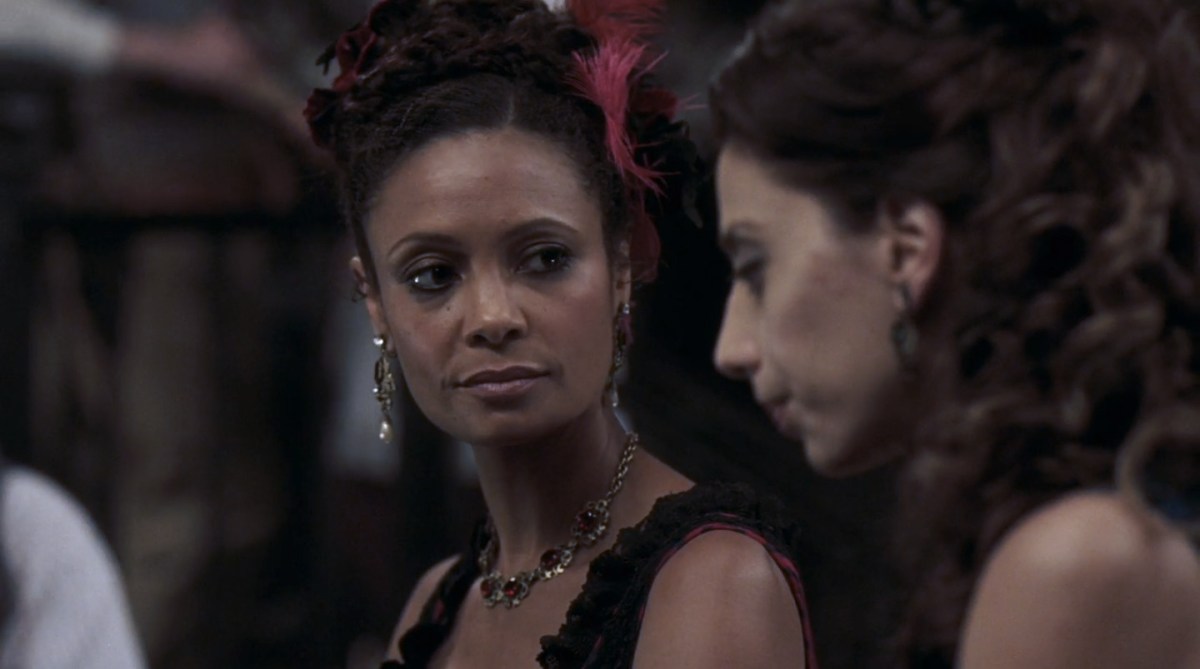





Published: Nov 2, 2016 04:17 pm